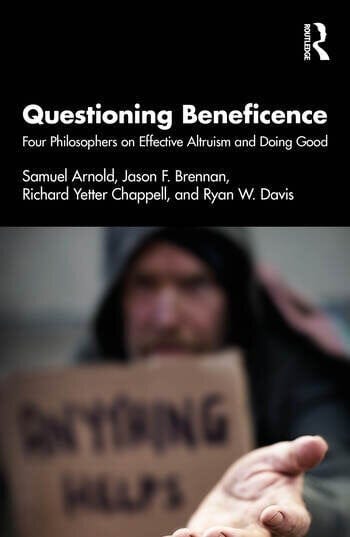Questioning Beneficence: Four Philosophers on Effective Altruism and Doing Good
By Richard Y Chappell🔸 @ 2024-09-28T15:45 (+41)
This is a linkpost to https://www.goodthoughts.blog/p/questioning-beneficence-excerpts
Questioning Beneficence: Four Philosophers on Effective Altruism and Doing Good—by Sam Arnold, Jason Brennan, Ryan Davis, and me—is now available from Routledge. It introduces a new “roundtable” format for debate books: each of us chose three questions relating to beneficence, wrote a “starter essay” on our own questions, wrote responses to each of the others’ starter essays, and then wrote a wrap-up response to the responses. The result is a lot of constructive engagement between our different viewpoints. I hope it’s as edifying to the reader as it was for me as an author!
As a nice bonus, the publisher has allowed me to publicly share some of my contributions to the volume (my introduction & starter essays, plus three of my responses to others’ questions). My plan is to share one essay a week on my substack, starting with the introduction today. If you’re impatient to read more, feel free to order the book!

Series contents
I’ll update the below list [on my original substack post] with links as I publish each post in the series.
- Introduction (below)
- How Important is Beneficence?
- Does Self-Sacrifice Make Beneficence More Virtuous?
- How Much Should We Care about Future Generations?
- Response to Arnold: Can Philanthropy Be Undemocratic?
- Response to Brennan: Can We Exercise Beneficence through Business?
- Response to Davis: Can Effective Altruism be Part of a Meaningful Moral Life?
Introduction: Three Questions Exploring Beneficence
Something I find exciting about Effective Altruism is the way that it exemplifies a deliberate, rational attempt to do more good as such. This is surprisingly rare. Many people are drawn to particular good causes. But strikingly few have pursued the project of moral prioritization, weighing the tradeoffs between all the various worthy causes out there, to try to determine which should be our top priority. Such judgments are always fallible, of course, and open to revision in light of new evidence and arguments. But rationally pursuing a difficult goal seems likely to get us closer to achieving it than would not even trying, so I consider it a good and worthy project.
An implicit assumption of Effective Altruism is that reasons of beneficence—or doing good—are among our strongest moral reasons. And Effective Altruists tend to have a distinctive, “utilitarian-esque” understanding of what our reasons of beneficence involve: roughly, improving global well-being. As someone with strong utilitarian sympathies myself, I’ve crafted my three questions with an eye to clarifying and exploring this distinctive conception of beneficence.
My first question asks whether EAs are right to ascribe such importance to our reasons of beneficence. I argue that they are, and more radically that we can assess how morally good a person is (to a first approximation) simply by looking at how much they (want to) do to improve global well-being.
My second question, on beneficence and self-sacrifice, looks at how acting to promote the good can diverge from ordinary conceptions of “altruistic” behavior (which place more weight on self-sacrifice than on actually helping others). In my essay, I argue that the ordinary conception illicitly conflates being good with looking good. So I think the EA conception is a clear improvement.
Finally, my third question asks how much we should care about future generations. The “longtermist” branch of EA has courted controversy by suggesting that slight reductions to the risk of human extinction can morally outweigh saving lives for certain. This is a departure from ordinary assumptions about how we should help others. But again, I argue that these revisionary verdicts are well warranted in principle.